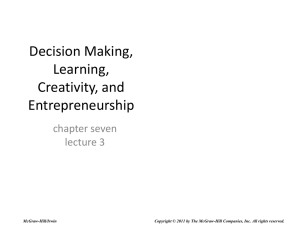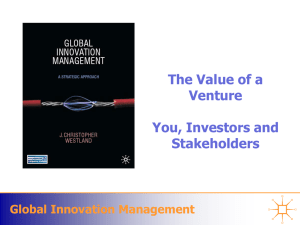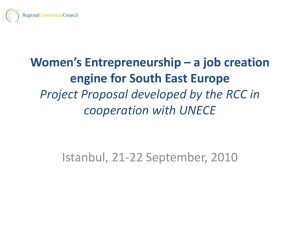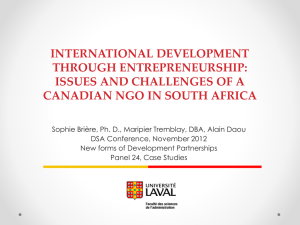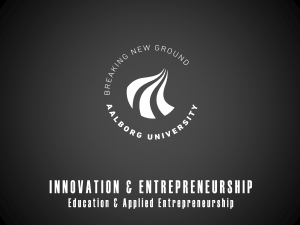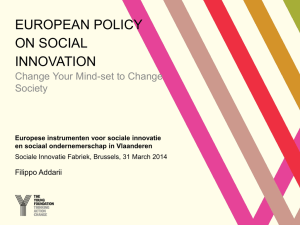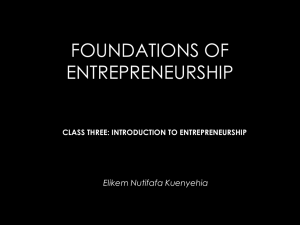Presentation Danti
advertisement
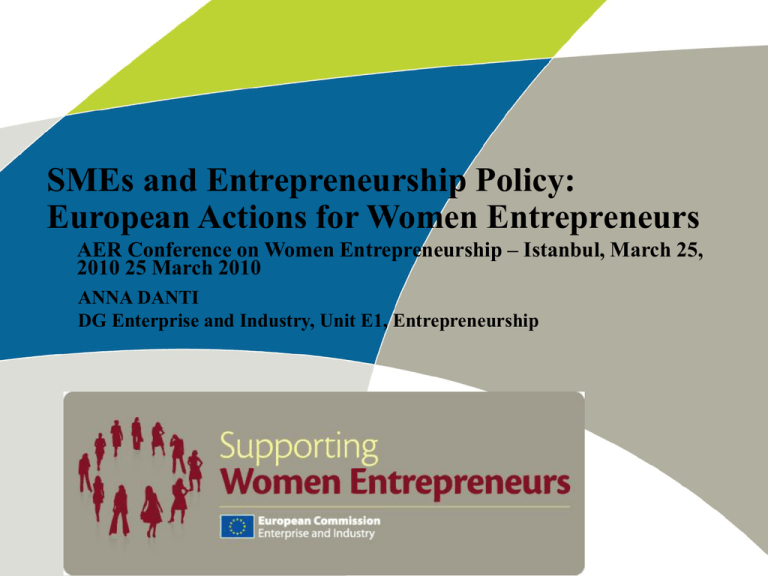
SMEs and Entrepreneurship Policy: European Actions for Women Entrepreneurs AER Conference on Women Entrepreneurship – Istanbul, March 25, 2010 25 March 2010 ANNA DANTI DG Enterprise and Industry, Unit E1, Entrepreneurship What is Entrepreneurship? Entrepreneurship refers to an individual’s ability to turn ideas into action (Commission) creativity, innovation risk acceptance, the ability to plan and manage projects in order to achieve objectives. (Council Recommendation on Key Competences for Lifelong Learning COM(2005)548 Promotion of Entrepreneurship Lisbon Agenda Small Business Act (SBA) Charter/SBA conference • Administrative procedures Start-up procedures License procedures Bankruptcy & 2nd chance Transfer of business • Ease of access to finance JEREMIE, EIB loans, CIP GBER FP7 • Management capacitation Mg. Capacity building • Entrepreneurial spirit ERASMUS Female entrepreneurship SME week Entrepreneurship education Desirability 70 20 18 16 20 19 21 21 26 24 28 29 28 30 29 29 30 30 31 30 33 33 37 37 39 42 47 40 How desireable is it to become self-employed in the next 5 years? Source: Flash Eurobarometer 192, December 2006 - January 2007 AT BE DE DK NL SE SI HU FR SK ES LU UK CZ PT EU25 FI EE MT CY IE IT US EL LT 0 PL 10 LV percent 50 48 48 50 60 Still a “classical” profile Desirability by social group percent How desirable is it for you to become self-employed within the next 5 years? Comparison between socio-economic groups 100 80 60 40 20 0 4 4 5 66 62 69 30 33 27 EU25 Men Women 4 4 4 46 57 68 51 15-24 2 80 41 28 13 25-39 40-54 55+ Don't know / No answer Rather undesirable and not desirable at all Very and rather desirable Source: Flash Eurobarometer 192, December 2006 - January 2007 PROMOTING WOMEN ENTERPRENEURS IS WISE AND NECESSARY • At the heart of the Lisbon strategy: ensure that the proportion of women in active employment exceeds 60% by 2010 • The entrepreneurial potential of women constitutes an underdeveloped source of economic growth and of new jobs • Women constitute, on average, 30% of entrepreneurs in the EU. (36% start-ups 20% industry) • They often face greater difficulties than men in starting up businesses and in accessing finance and training. • It is essential to provide women the support they need in order to start-up and manage their own enterprise. 1.THE EUROPEAN NETWORK TO PROMOTE WOMEN’S ENTREPRENEURSHIP (WES) • launched in June 2000 • It is composed of government representatives responsible for the promotion of women entrepreneurship. • It has 30 members from the European Union, EEA and candidate countries. • Meetings twice a year • Annual activity report • Advice on future policy orientation WES OBJECTIVES • Raising the visibility of existing women entrepreneurs • Create a climate that is favourable to woman entrepreneurs • Increase the number of new women entrepreneurs • Increase the size of existing women-led businesses 2. NETWORKING: CO-OPERATION WITH BUSINESS ORGANISATIONS OF WOMEN ENTREPRENEURS • Contacts and exchange of information, with many national business organisations of women entrepreneurs from all the EU 27 countries and also from abroad. For example: FEM-UEAPME - Female Europeans of Small and Medium Enterprises FCEM - The Worldwide Network of Women Business Owners EWN - Eurochambres Women's Network etc. 3. WOMEN’S ENTREPRENEURSHIP PORTAL • Provides links to the websites of women entrepreneurs’ representative organisations, networks, projects and events that relate to the promotion of female entrepreneurship. • The information on 5 areas: National organisations of women entrepreneurs International organisations of women entrepreneurs Networks Projects Events related to women entrepreneurship 4. Small Business Act 1. Create an environment in which entrepreneurs and family businesses can thrive and entrepreneurship is rewarded This includes (politically binding principles) - the creation of the European Network of Female Entrepreneurship Ambassadors - mentoring schemes for women to set-up their own business - encourage entrepreneurship amongst women graduates part of the entr. education call. 2. General Block Exemption Regulation on State Aids (GBER) (Legislative measures- already adopted) Enable state aid for small enterprises newly created by female entrepreneurs without DG COMP procedure up to €1M THE EUROPEAN NETWORK OF FEMALE ENTREPRENEURSHIP AMBASSADORS • Launched on 5 October 2009 in Stockholm • Currently has 10 European Countries as members:Denmark, France, Germany, Iceland, Ireland, Italy, Norway, Poland, Slovakia, Sweden • Second call for proposals open to include remaining CIP countries (deadline 12 March 2010) THE AMBASSADORS • Serve as role models and highlight the role that women can play in creating jobs and promoting competitiveness. • Promote entrepreneurship in schools, universities, community groups and the media, aiming to inspire women and young girls to set up their own businesses. • Telling their own stories will help to raise confidence in setting up and creating successful businesses in all areas. 1/ ENTREPRENEURSHIP EDUCATION FOR WOMEN GRADUATES Project: ‘Women@Business’ EL, ES, IT, CY, UK • The project main objectives are: • to create the correct conditions for young female graduates and young women from ethnic minorities or immigrant backgrounds, to be encouraged to pursue entrepreneurship • to produce an innovative and sustainable model of a full consultancy package to promote entrepreneurship 2/ MENTORING SCHEMES FOR WOMEN ENTREPRENEURS call Autumn 2010 STUDY ON WOMEN INNOVATORS AND ENTREPRENEURSHIP Data shows: • No more than 8.3% of patents awarded by the European Patent Office are awarded to women. • 20.3% of businesses started with venture capital belong to female entrepreneurs. • In Europe 5%-15% of high-tech business is owned by women. • Women score less than men when assessing the level of innovation of their own business (expl. process innovation: 4.1% women 7.8% men; marketing innovation: 9.1% women - 10.45% men). Further results • Women are lagging behind on innovative entrepreneurship and encounter specific challenges. • Women’s ideas for innovation are as marketable as men’s, but… • Innovative ideas are not recognised by predominantly male stakeholders. • Stereotypes about women in innovative sectors and difficulties in balancing work and family still persist. • Stakeholders not aware of women’s different needs and there are no measures attempting to attract women. • Dates: 25 May until 1 June 2010, but all events taking place in May & June and responding to its objectives can join • 37 countries participating: EU27 + Albania, Croatia, FYROM, Iceland, Israel, Liechtenstein, Montenegro, Norway, Turkey & Serbia • Main tool is a website http://ec.europa.eu/sme-week • Female entrepreneurship is a topic identified on the website Please feel free to get in contact with your NCs and plan events in your country! CONTACTS • WOMEN ENTREPRENEURS http://ec.europa.eu/enterprise/policies/sme/promoting-entrepreneurship/women/index_en.htm • CALL FOR PROPOSALS FOR THE EUROPEAN NETWOR OF FEMALE ENTREPRE NEURSHIP AMBASSADORS NETWORK http://ec.europa.eu/enterprise/newsroom/cf/itemlongdetail.cfm?item_id=3917&lang=en • FEMALE ENTR AMBASSADORS NETWORK http://ec.europa.eu/enterprise/policies/sme/promotingentrepreneurship/women/ambassadors/index_en.htm • ENTERPRISE EUROPE NETWORK http://www.enterprise-europe-network.ec.europa.eu/index_en.htm • ON LINE TOOL FOR SME FUNDING http://ec.europa.eu/enterprise/policies/finance/guide-to-funding/index_en.htm
